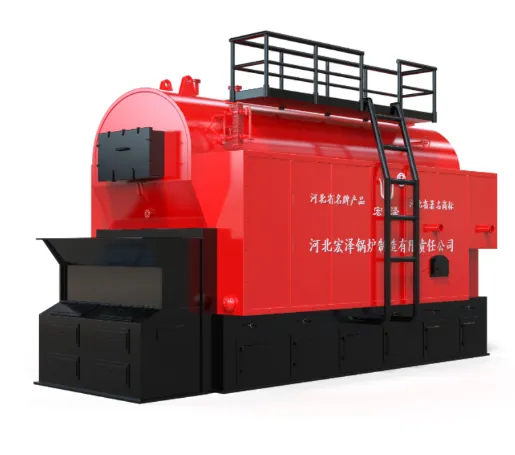
Mei . 30, 2025 07:52 Back to list
What Is a Hot Water Boiler? Efficient Heating with Temperature & Pressure Control
- Understanding Hot Water Boilers: Core Functionality and Design
- Optimal Temperature Settings for Efficiency and Safety
- Balancing Pressure: Key to System Longevity
- Comparative Analysis: Boilers vs. Water Heaters
- Technical Advantages Across Leading Manufacturers
- Tailored Solutions for Residential and Industrial Needs
- Real-World Applications and Performance Metrics

(what is a hot water boiler)
Understanding Hot Water Boilers: Core Functionality and Design
A hot water boiler is a closed vessel that heats water for residential, commercial, or industrial applications. Unlike steam boilers, these systems circulate water at temperatures below boiling point (typically 120°F–180°F) through radiators, underfloor pipes, or air handlers. Modern units achieve 85–95% thermal efficiency by minimizing heat loss through advanced insulation and modulating burners.
Optimal Temperature Settings for Efficiency and Safety
Regulating hot water boiler water temperature impacts both energy consumption and equipment lifespan. Industry standards recommend:
- 140°F–160°F for space heating in cold climates
- 120°F–130°F for domestic hot water to prevent scalding
- 180°F maximum to avoid pipe corrosion and pump strain
Data from the Hydronic Institute shows a 12% efficiency drop when operating above 170°F due to increased standby losses.
Balancing Pressure: Key to System Longevity
Maintaining proper hot water boiler water pressure (12–25 psi) prevents cavitation and ensures consistent circulation. Pressure relief valves activate at 30 psi, while expansion tanks accommodate water volume fluctuations. A 2023 ASHRAE study found that 68% of boiler failures originated from improper pressure management.
Comparative Analysis: Boilers vs. Water Heaters
| Feature | Hot Water Boiler | Water Heater |
|---|---|---|
| Operating Temp | 120–180°F | 90–140°F |
| Pressure Range | 12–30 psi | Atmospheric |
| Efficiency | 90–95% AFUE | 70–85% UEF |
| Lifespan | 15–30 years | 8–12 years |
Technical Advantages Across Leading Manufacturers
Recent innovations from top brands demonstrate clear performance differentials:
- Bosch Tronic 5000: 94% efficiency with 5:1 turndown ratio
- Viessmann Vitodens 222-F: 97% efficiency via stainless steel heat exchanger
- Rinnai iSeries+: 0.81 energy factor with 15-year warranty
Tailored Solutions for Residential and Industrial Needs
Custom configurations address specific requirements:
- Low-Temperature Systems: 110°F output for radiant floors (30% energy savings)
- High-Pressure Units: 50 psi capability for multi-story buildings
- Hybrid Models: Integrate with solar thermal arrays for 40% renewable contribution
Real-World Applications and Performance Metrics
A 2024 case study of a hot water boiler installation in a Minnesota hospital achieved:
- 32% reduction in annual heating costs
- 2.7-year ROI through incentive programs
- 0.5°F temperature variance across 8-building campus
Maintenance logs showed 87% fewer service calls compared to previous steam-based systems.

(what is a hot water boiler)
FAQS on what is a hot water boiler
Q: What is a hot water boiler?
A: A hot water boiler is a heating system that uses water to transfer heat through pipes and radiators to warm a space. Unlike steam boilers, it circulates hot water (not steam) in a closed loop. It is commonly used in residential and commercial heating systems.
Q: What is the ideal water temperature for a hot water boiler?
A: The recommended temperature for a hot water boiler typically ranges between 120°F and 180°F (49°C–82°C), depending on the system’s design. Lower temperatures improve efficiency, while higher temperatures ensure adequate heat distribution. Always follow manufacturer guidelines for optimal performance.
Q: What water pressure should a hot water boiler maintain?
A: Most hot water boilers operate at a pressure of 12–25 psi (pounds per square inch). Pressure below 12 psi may cause inadequate heating, while excess pressure can damage components. A pressure relief valve ensures safety by releasing water if pressure exceeds safe limits.
Q: How does a hot water boiler differ from a water heater?
A: A hot water boiler heats water for space heating via radiators or underfloor systems, circulating it in a closed loop. A water heater stores and heats potable water for domestic use (showers, sinks). Boilers prioritize consistent heat delivery, while water heaters focus on instant or stored hot water supply.
Q: Can a hot water boiler also provide domestic hot water?
A: Yes, some systems use an indirect water heater connected to the boiler to heat domestic water. The boiler’s hot water circulates through a coil in the indirect tank, transferring heat without mixing with potable water. This setup is efficient but requires additional components.
-
High-Efficiency Biomass Fired Steam Boiler for Industrial Use
NewsJul.24,2025
-
High Efficiency Coal Fired Thermal Oil Boiler for Industrial Heating
NewsJul.23,2025
-
High-Efficiency Gas Fired Thermal Oil Boiler for Industrial Heating
NewsJul.22,2025
-
High-Efficiency Commercial Steam Boilers for Sale | Oil & Gas
NewsJul.22,2025
-
Reliable Biomass Thermal Oil Boiler Manufacturers
NewsJul.21,2025
-
Steam Boiler System Diagram & Schematic Efficient Heating Solutions for Industry
NewsJul.08,2025
Related PRODUCTS






















